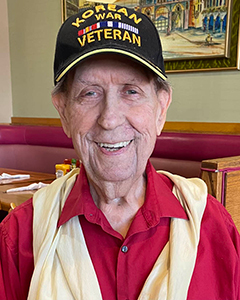Army Korean War Chicago, IL Flight date: 04/10/24
By Marilyn Lucas, Honor Flight Chicago Veteran Interview Volunteer
Glenn Hall, affectionately known as Rufus, was born in Idlewild, Tennessee. Rufus was the middle child of a family of seven. Idlewild was a small farm town of about 300 people. Like so many young men in 1950, Glen joined the National Guard after high school. He was activated in August 1950 and attended boot camp at Fort Campbell where he learned about bridge building prior to being sent to Korea via Japan. A note of interest: Rufus is wearing a scarf in the portrait picture below that was awarded to him at a dinner celebrating his service to the Korean people. The scarf was created in 1950 as a commemorative item for foreign soldiers who fought in the Korean war.
The 2998 Engineering Treadway Bridge Company went from Japan to Korea — it was an overnight trip. They were actually on a Japanese ferry boat. The ferry boat did not have a kitchen but did have c-rations for emergencies. The unit mission was to construct bridges that consisted of rubber pontoons that supported steel roadways. The bridges were fast to set up, usually taking less than a day and all the equipment necessary was brought to the work site by trucks. The bridges were used for personnel to cross back-and-forth, with equipment and supplies, from South to North Korea, and were put together like a puzzle.
Not only were the bridge company responsible for building these bridges but on one occasion given the task of dismantling one. On Christmas Day the unit was offered a case of beer if they could achieve this in one day. The purpose of dismantling this bridge was to prevent the enemy from entering South Korea via the bridge. The unit was also in charge of guarding these bridges. Rufus was specifically in charge of monitoring and repairing weapons. He commented “there were so many weapons that I had very few repairs”.
Rufus laughingly showed a picture of himself with a buddy. Of course, Rufus is holding the canteen and the buddy is holding the gun. He left it to one’s imagination as to what was in the canteen. Jokingly, the frisky middle child said, “They would put me to work if they could catch me.” Rufus also acquired an unusual nickname while in Korea: “combat.” One of his buddies sarcastically came up with his moniker because Rufus dove so fast into the dirt to get out of the range of fire.

On a serious note, Rufus shared a story about three bodies left in a lagoon. No one would venture out to retrieve these bodies. Not knowing whether they were North Korean, South Korean, or American, Rufus swam out to retrieve the bodies. “I just wanted to respect them.”
He spoke about the 36,000 lives that were lost during this war. He also commented on the mass destruction of the country and the sad pictures of people seeking refuge. At this point, Rufus shared his first thoughts when he arrived in Korea, “What are we doing here?” He noted North and South Korea shared a common language and a common appearance and customs. Why were they fighting? A question asked about so many wars. He soon learned the captured North Koreans did not want to return to battle. They felt safe with the Americans. “We were good to our prisoners.”
Rufus was discharged in May of 1952. He was diagnosed with PTSD and spent 11 months in a VA hospital in Memphis, Tennessee. In speaking of his return home, he stated “it was really no big deal.” People were still focused on World War II. It seemed like the American public treated the Korean War as a battle instead of a war. he spoke fondly of Russell Courtney, whom he met in the National Guard. He and Russell remained friends for 70 years until Russell’s recent passing.
With the onset of years, he has lost track of the memorabilia and medals. He does not appear to put a great deal of importance on those items. It was important for Rufus to share the story concerning his brother and brother-in-law who served in the Battle of Chosin Reservoir. This was the site of one of the most brutal battles between the UN Forces and Chinese Communist forces during the Korean War. For approximately 17 days roughly 30,000 US Soldiers and Marines faced an enemy force estimated around 120,000 over rugged terrain and lethally cold weather. The purpose was to cut off the enemy supply lines. He exclaimed they were the real heroes in his family.
After his return home, Rufus worked for the railroad in the capacity of a welder, a trade he had learned while in the military. He married his wife, Mattie. They had two children, David and Glenda. He also has another child, Rosemary, who lives in California.
Rufus currently lives in Chicago. He is an active and spunky 91-year-old. He focuses on the good things in life and brings a wonderful sense of humor to the stories he tells from his time in Korea.
Rufus, thank you for your years of service to our country. enjoy your day of honor as you experience Washington D.C. for the first time.


